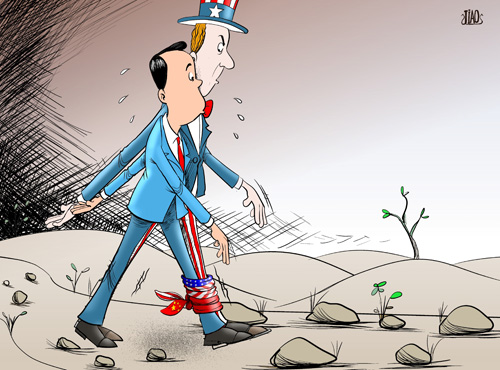
At U.S. President Barack Obama’s invitation, Chinese President Xi Jinping will conduct a state visit to the United States. The trip will be closely watched as a weighty and potentially pivotal affair that will sketch the future of the U.S.-China relationship, which has already entered a new stage in its development. Chinese Ambassador to the United States Cui Tiankai has stated that preparations for President Xi’s visit are progressing rapidly and that the itinerary will be a “string of highlights,” in addition to having expressed his confidence that the results will be a “pleasant surprise” for many. As such, Xi’s trip is now being highly anticipated by many around the world.
One question is whether or not the format will continue in the same vein as the previous California estate summit and the evening meeting at Yingtai in Beijing. Such unique settings for interaction and exchange between the U.S. and Chinese heads of state have become a hallmark in their discussions to establish a new cooperative and mutually beneficial model of great power relations, while also serving a crucial role of deepening mutual understanding and friendship. Talks between the United States’ and China’s highest offices play an irreplaceable role in expanding cooperation, increasing trust, and effectively managing differences of opinion between the two nations, and they will help produce even more substantive results from the U.S.-China relationship.
Next, the two leaders will be looking to bridge the gap from our past to create a new future. As the largest developed and developing nations, respectively, the United States and China are now poised to write a new page in history and already shoulder many heavy responsibilities together. Charting a course for the future and sailing this great ship of U.S.-China relations in the proper direction to successfully reach distant shores is of vital importance to both the two nations’ relationships and the interests of their people, and will have far-reaching regional and international consequences.
Finally, there is the question of how to perform “addition and subtraction” within the relationship. “Addition” entails the cutting of a larger cooperative piece of the pie and bringing the benefits of said cooperation increasingly to bear upon both nations and the rest of the world, while “subtraction” means minimizing or eliminating points of contention rather than allowing them to dominate the conversation. Cooperation is the overarching melodic theme within U.S.-China relations, a fact that has been predetermined by the two countries’ unique positions. The issues of the South China Sea, cybersecurity, human rights and other hotly debated topics are no more than sporadic interludes for which there should be appropriate resolution channels and mechanisms in place; without them, those issues may produce distortions capable of propagating misconceptions among outside observers, misconceptions that would significantly affect how people assess the state of U.S.-China relations.
The United States and China both recognize the importance of President Xi’s visit. Lately, high-ranking U.S. officials have made a series of trips to Beijing, with both U.S. National Security Advisor Susan Rice and U.S. Assistant Secretary for East Asian and Pacific Affairs Daniel Russel flying to China for discussions. China will also be sure to keep in sync with the United States by sending its own senior officials to Washington. Both sides are now making meticulous preparations to ensure President Xi’s U.S. trip garners satisfactory results and sets a new milestone in relations between the two nations.
At the same time, it should be noted that the trip is taking place during the lead up to the U.S. general election, and with the intense ongoing debate about relations with China among the American public, a multitude of voices and opinions will be thrown into the mix. With additional factors, such as an overrun from both countries’ internal politics that is muddying the waters, the encounter seems fixed to be anything but relaxed.
History has taught us that the stronger the political undercurrents at such crucial moments, the greater the need to bolster levels of confidence, sincerity and resolve within U.S.-China relations and to continue forging ahead, despite any difficulties that may arise. President Nixon’s visit to China in 1972 and Deng Xiaoping’s trip to the United States in 1979 were both strategic steps taken at critical junctures in history to restore and improve relations between the two nations in spite of the obstacles, giving people in both countries and all over the world a “pleasant surprise.” One can expect that President Xi’s upcoming trip to the United States will do the same.
The author is a special commentator for the People’s Daily, as well as the vice president and a senior research fellow at the China Institute of International Studies.

Leave a Reply
You must be logged in to post a comment.